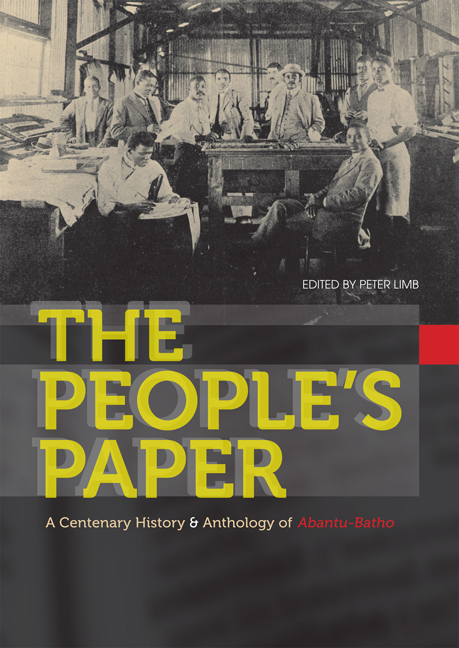Book contents
- Frontmatter
- Contents
- Contributors
- Acknowledgements
- Preface
- List of Abbreviations and Acronyms
- List of Illustrations
- PART I Essays
- Overview
- FOUNDERS AND EDITORS
- THEMES AND CONNECTIONS
- Chapter 6 The Swazi Royalty and the Founding of Abantu-Batho in a Regional Context
- Chapter 7 Abantu-Batho and the Xhosa Poets
- Chapter 8 African Royalty, Popular History and Abantu-Batho
- Chapter 9 ‘Johannesburg in Flames’: The 1918 Shilling Campaign, Abantu-Batho and Early African Nationalism in South Africa
- Chapter 10 Garveyism, Abantu-Batho and the Radicalisation of the African National Congress during the 1920s
- Chapter 11 An African Newspaper in Central Johannesburg: The Journalistic and Associational Context of Abantu-Batho
- Conclusion: Assessing the Decline and Legacy of Abantu-Batho
- PART II Anthology
Conclusion: Assessing the Decline and Legacy of Abantu-Batho
from THEMES AND CONNECTIONS
Published online by Cambridge University Press: 21 April 2018
- Frontmatter
- Contents
- Contributors
- Acknowledgements
- Preface
- List of Abbreviations and Acronyms
- List of Illustrations
- PART I Essays
- Overview
- FOUNDERS AND EDITORS
- THEMES AND CONNECTIONS
- Chapter 6 The Swazi Royalty and the Founding of Abantu-Batho in a Regional Context
- Chapter 7 Abantu-Batho and the Xhosa Poets
- Chapter 8 African Royalty, Popular History and Abantu-Batho
- Chapter 9 ‘Johannesburg in Flames’: The 1918 Shilling Campaign, Abantu-Batho and Early African Nationalism in South Africa
- Chapter 10 Garveyism, Abantu-Batho and the Radicalisation of the African National Congress during the 1920s
- Chapter 11 An African Newspaper in Central Johannesburg: The Journalistic and Associational Context of Abantu-Batho
- Conclusion: Assessing the Decline and Legacy of Abantu-Batho
- PART II Anthology
Summary
In the preceding chapters the origins, history, and content of Abantu-Batho are described and explained from a wide array of perspectives, ranging from the close connection with African National Congress (ANC) and Swazi politics to the role of prominent individuals and editors such as Pixley Seme, Queen Labotsibeni and Robert Grendon; the presence in its columns of poetry and representations of African kings; and international connections with other African countries and Garveyism. Discourses of nation, gender, class, religion and other themes in Abantu-Batho are also discussed. The chapters by Jeff Opland, Chris Saunders, Chris Lowe and Grant Christison show not just the creativity and resilience of contributors, but also how political and personal rivalries, human frailty and, at times, intolerance battered the image of the paper. On the other hand, chapters by Sifiso Ndlovu, Robert Vinson, Paul Landau and Sarah Mkhonza reveal Abantu- Batho as a vibrant forum for a wide range of solidarities of race, class, and gender, and as a way of maintaining or recovering the dignity of Africans and their history. It remains to sketch and explain the fate of this fascinating and little-studied newspaper, and assess its contribution to South African society and history. Its life spanned a substantial period across the history of the black press, but its slow demise was increasingly apparent from the 1920s, for several reasons.
DEMISE
In 1918 C. S. Mabaso signed on behalf of Abantu-Batho for another year of translating and publishing into ‘Sotho, Xhosa, and Zulu … all Proclamations and Government notices affecting the native population’. In February and again in July and August 1918 the government printer, F. W. Knightly, and the Director of Native Labour, Colonel Cooke, urged Native Affairs to review this subsidy, which was now £150 per annum. Cooke drew attention to sharp criticism of Smuts in the issue of 14 February and even more questionable (in his view) articles, notably a leader attacking Saul Msane for his opposition to strikes. Little could be done at the moment, but Cooke hoped that ‘as two of the responsible editors are at present under arrest’, this could offer an excuse to decline to renew the agreement without objecting to any particular article.
- Type
- Chapter
- Information
- The People’s PaperA Centenary History & Anthology of Abantu-Batho, pp. 318 - 330Publisher: Wits University PressPrint publication year: 2012



